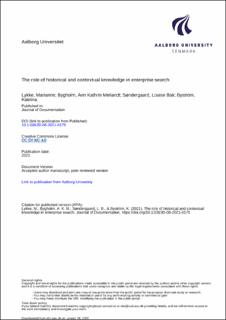The role of historical and contextual knowledge in enterprise search
Peer reviewed, Journal article
Accepted version
Permanent lenke
https://hdl.handle.net/11250/2986857Utgivelsesdato
2021-12-20Metadata
Vis full innførselSamlinger
Originalversjon
https://doi.org/10.1108/JD-08-2021-0170Sammendrag
Purpose: The purpose of the study is to examine enterprise searching practices across different work areas and work tasks in an enterprise search system in an international biotechnology company.
Design/methodology/approach: A mixed-method approach studying employees’ authentic search activities during a 4-months period by log data, questionnaire survey, and interviews. The log data analysed the entire active searcher group, whereas the questionnaire and interviews focused on frequent searchers.
Findings: The three studies provided insight into the searching activities and an understanding of the way searchers used the enterprise search system to search for information as part of their work tasks. The data identified three searcher groups, each with specific search characteristics. Four work task types were identified, and for all four types the searchers applied a tracing searching technique with use of contextual and historical relationships as paths.
Practical implications: The findings point to the importance of knowledge on historical and contextual relations in enterprise search.
Originality/value: The work sheds new light on enterprise searchers’ information search practices. A significant contribution is the identification of a tracing search method used in relation to four essential work task types. Another contribution is the importance of historical and contextual knowledge to support the tracing search and decide what paths to follow.

